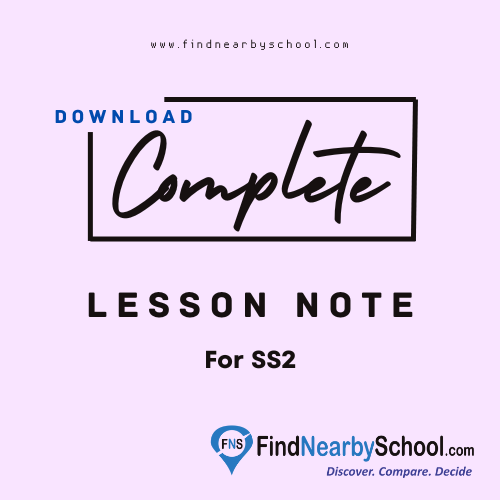Description
SS2 Government Scheme of Work for First, Second and Third Term: These lesson notes cover the following topics.
First Term:
1. Elections: Meaning, Functions, Demerits and Types of Elections, Merits and Demerits of Types
2. Types of Voting- Merits and Demerits of each Type of Voting- Free and Fair Election- Meaning, Conditions Necessary for the Conduct of a Free and Fair Elections
3. Electoral Commission- Meaning Features and Functions.
4. Public Administration- The Civil Service: Meaning, Features, Structures/Classes, Functions, Problems and Control: The Civil Service Commission- Meaning, Functions, Ombudsman, Meaning and Functions
5. Public Corporation- Meaning, Characteristics, Reasons for Setting up Public Corporations, Functions, Organizational Structure, Differences between Public and Civil Service, Control of Public Corporation.
6. Local Government: Definition, Powers and Functions, Reasons for the Creation of Local Government, Control of Local Government, Control, Problems and Suggested Solutions to Problems of Local Government.
7. Pre-Colonial Political System in Nigeria; Hausa/Fulani Political System, Igbo Political System.
8. Pre-Colonial Political System: Yoruba Political System- Pre-colonial Political Institutions with their Functions-Traditional Rulers, Council of Elders, Secret Societies, Age Grade etc.
9. Colonial Administration: Historical background, Meaning, Reasons, Features and Classification.
10. British Colonial Policy: Indirect Rule System-North, West and East- Merits and Demerits of Indirect Rule.
11. French Colonial Policy: Historical Background- French Colonial Policies-Assimilation and Association- Features and Reasons for the Failure of Assimilation-Compare British and French Colonial Policies.
Second Term:
1. Colonialism- Both Positive and Negative Impacts.
2. Nationalism- Meaning, Factors that Led to the Rise and Growth of Nationalist Movement in West Africa.
3. Nationalism- Factors that Increased Nationalist Demand after World War 11, Factors Responsible for Slow Nationalist Activities in French West Africa Colonies.
4. Constitutional Development in Nigeria- The Nigerian council of 1914, The National Congress of British West Africa.
5. Clifford Constitution of 1922- Features, Merits and Demerits; Richard’s Constitution of 1946-Features, Objectives, Achievement, Weakness and Criticism.
6. The Macpherson Constitution of 1951- Features, Achievements and Weakness; London and Lagos Constitutional Conference of 1953 and 1954 Respectively.
7. Littleton’s Constitution of 1954- Features, Achievements, Weakness.
8. London Constitutional Conference of 1957 and Lagos Constitutional Conference of 1958.
9. Independence Constitution of 1960- Features, Achievements and Weakness.
10. Republican Constitution of 1963- Features, Merits and Demerits.
11. The Second Republican Constitution of 1979- Historical Background, Features, Merits and Demerits;the Differences between 1963 and 1979 Constitution.
12. Revision and Examination.
REFERENCE
• Essential Government by C.C. Dibie.
• Comprehensive Government by J.U. Anyaele.
Third Term:
WEEK 1:
• REVISION
• THE NORTHERN PEOPLES’ CONGRESS
• THE ACTION GROUP (AG)
• THE MINER POLITICAL PARTIES OF THE FIRST REPUBLIC UMBC, NEPU E T C
• ORGANIZATIONAL STRUCTURE, SOURCES OF FINANCE, OBJECTIVES AND PERFORMANCE.
WEEK 2 AND 3
• SECOND REPUBLIC POLITICAL PARTIES DEVELOPMENT OF POLITICAL PARTIES IN NIGERIA II
• NATIONAL PARTY OF NIGERIA (NPN)
• UNITY PARTY OF NIGERIA (UPN)
• NIGERIA PEOPLES’ PARTY (NPP)
• GREAT NIGERIA PEOPLE PARTY (CNPP)
• NIGERIA ADVANCE PARTY (NAP)
• FORMATION, STRUCTURE, SOURCES OF FINANCE, OBJECTIVES AND PERFORMANCE
WEEK 4
• THE THIRD AND FOURTH REPUBLICS POLITICAL PARTIES: DEVELOPMENT OF POLITICAL PARTIES IN NIGERIA III
• SOCIAL DEMOCRATIC PARTY (SDP)
• NATIONAL PEPUBLICAN CONVENTION/NRC
• PEOPLES DEMOCRATIC PARTY (PDP)
• ALL NIGERIA PEOPLES PARTY (ANPP)
• ALLIANCE FOR DEMOCRACY (AD)
• ACTION CONGRESS OF NIGERIA (CAN)
• CONGRESS FOR PROGRESSIVE CHANGE (CPC)
• OTHER MINOR POLITICAL PARTIES: FORMATION, STRUCTUREAL ORGANISATION, SOURCES OF FINANCE, OBJECTIVES AND PERFORMANCE.
WEEK 5 AND 6
• MILITARY RULE IN NIGERIA
• HISTORICAL BACKGROUND
• REASONS FOR MILITARY INTERRVENTION
• ACHIEVEMENT OF MILITARY REGISMES IN NIGERIA
• STRUCTURE OF MILITARY REGIMES IN NIGERIA
• WEAKNESS OF MILITARY GOVERNMENT IN NIGERIA
• MEASURES THAT COULD BE TAKEN TO PREVENT MILITARY INTERRVENTION IN NIGERIA
WEEK 7 AND 8
• LOCAL GOVRNMENT ADMINISTARTION IN NIGERIA
• STRUTURE, FUNCTIONS OF LOCAL GOVERNMENT, SOURCES OF FINANCE, PROBLEMS, 1976 LOCAL GOVERNMENT REFORMS
• ROLES OF TRADITIONAL RULES IN GOVERNMENT
WEEK 9 AND 10
• NIGERIA AND THE WORLD
• INTERDEPENDENCE OF NATIONS: THE NEEDS FOR INTERACTIONS, MERITS AND DEMERITS
• THE NIGERIA FOREIGN POLICY SINCE INDEPENDENCE, FACTORS THAT CAN AFFECT NIGERIA’S FOREIGN POLICY. FORMATIONLATION OF NIGERIA’S FOREIGN POLICY, FEATURES OF NIGERIA FOREIGN POLICY.
WEEK 11 AND 12
• REVISION AND EXAMINATION.



Reviews
There are no reviews yet.